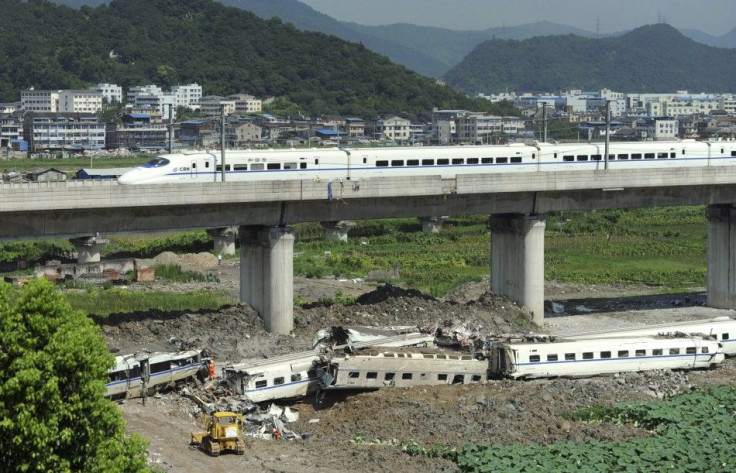China's effort to muzzle news of train crash sparks outcry

Government directives demanding journalists not question official accounts of a deadly high-speed train crash in eastern China are fueling public anger and suspicion about conflicting details of the accident, such as the death toll.
Saturday night's crash killed at least 38 people and was China's deadliest rail disaster since 2008, raising new questions about the safety of the fast-growing and high-profile high-speed rail network.
The central propaganda department issued directives to media on Sunday for coverage of the accident.
"The major theme for the Wenzhou bullet train case from now on will be known as 'in the face of great tragedy, there's great love'," the department said, according to a copy of the directives posted on a web site called the "ministry of truth", that regularly posts copies of government orders.
"Do not question, do not elaborate."
Reporters with state media who saw the directives confirmed to Reuters the propaganda department's media guidance on the crash.
The department also told media not to "investigate the cause of the accident", and reminded journalists that "the word from the authorities is all-prevailing".
Accounts of the media controls soon found their way onto the Internet, sparking debate and demands from ordinary Chinese for answers to questions not found in the official accounts.
"We have the right to know the truth!" wrote one microblogger called kangfu xiaodingdang. "That's our basic right!"
Compounding the problem, the state-run Xinhua news agency said late on Sunday that eight additional bodies had been found, bringing the death toll to 43. But a Railways Ministry spokesman then said the total figure was actually 35.
On Monday, the official count stood at 38.
Seeking to assuage public anger, the government sacked three middle-level railway officials on Sunday [ID:nL3E7IO01D]. The media directives appear to show a government hoping to contain the outrage.
Any attempt to link the crash to the reliability of China's much feted high-speed rail system was off-limits, according to the department.
"UP TO STANDARD"
The Railways Ministry says it is investigating the cause of the accident. State media has said a bullet train hit another express which lost power following a lightning strike, adding that the power failure knocked out an electronic safety system designed to alert trains about stalled locomotives on the line.
At a morgue in Wenzhou, near the crash site in eastern Zhejiang province, a crowd of people who gathered on Monday to identify the dead demanded answers.
"The first train had stopped due to a fault. So how can the other train which was driving through be involved in such an accident?" said 53-year-old Shi Zhengxiang, whose son-in-law was killed in the crash.
Despite the directives, Chinese journalists chased after the Railways Ministry spokesman, Wang Yongping, after he tried to slip away after a 45-minute briefing on Sunday.
"There will be many people who think that this is a safety problem caused by high-speed rail itself," Wang said. "I should still say to society that China's high-speed rail technology is up to date, up to standard, and we still have faith in it."
But reporters were not satisfied.
"You promised you would answer all the questions," one reporter shouted, as Wang hurried down a stairwell.
China has called for openness and accountability since being criticized for a bid to suppress information about an outbreak of the deadly SARS virus, which contributed to the disease's eventual spread to 8,000 people around the world.
Li Datong, a former journalist sacked for challenging censorship, said the government was imposing controls whenever there was a disaster, which would only fuel public suspicion.
"People don't trust anything the government says anymore," Li told Reuters. "They think that whatever they say is a lie. There is no confidence in state media.
© Copyright Thomson Reuters {{Year}}. All rights reserved.





















